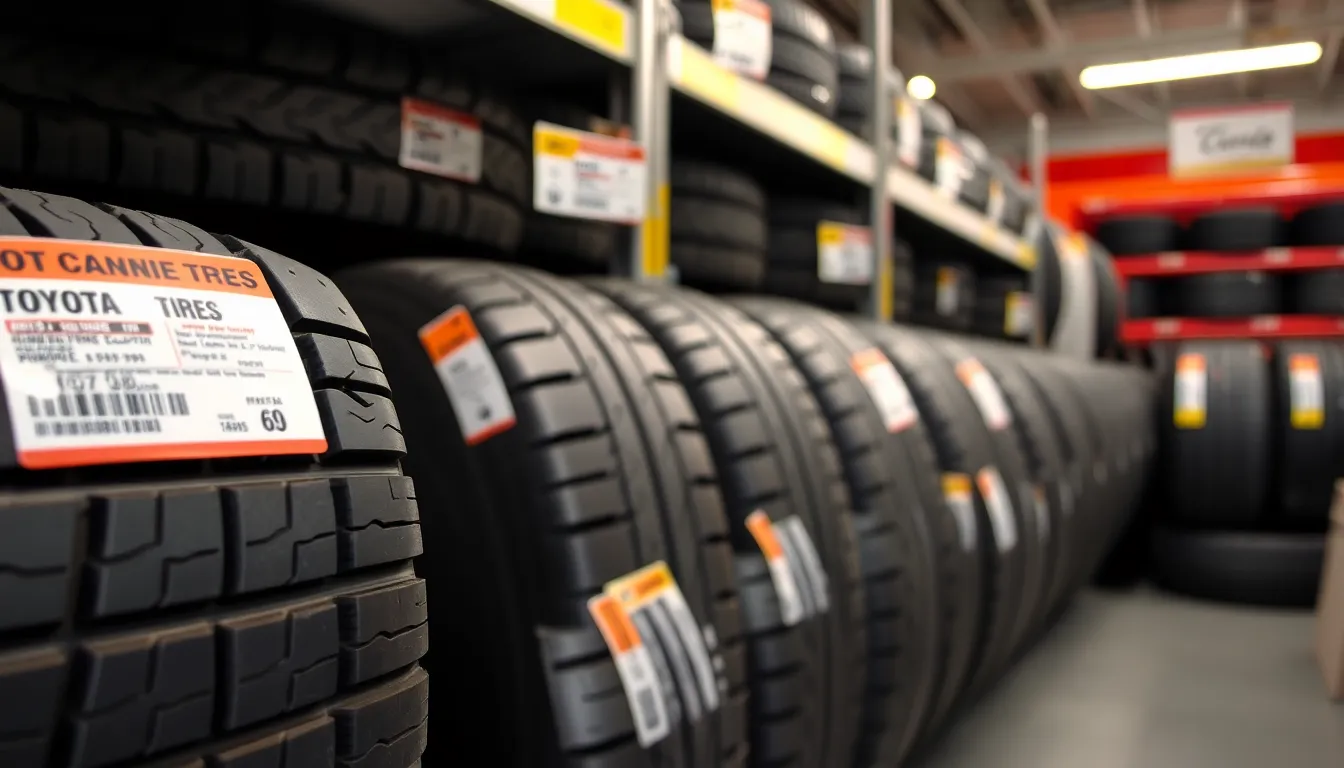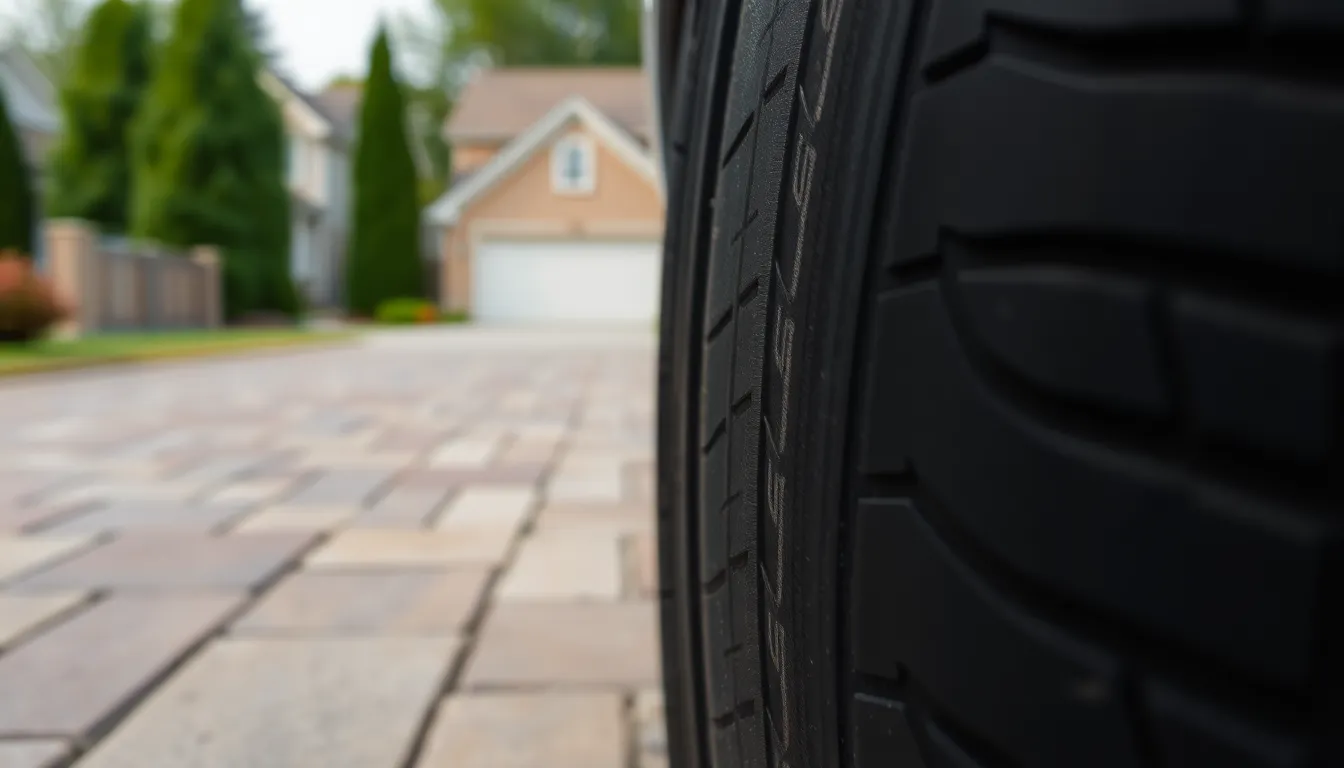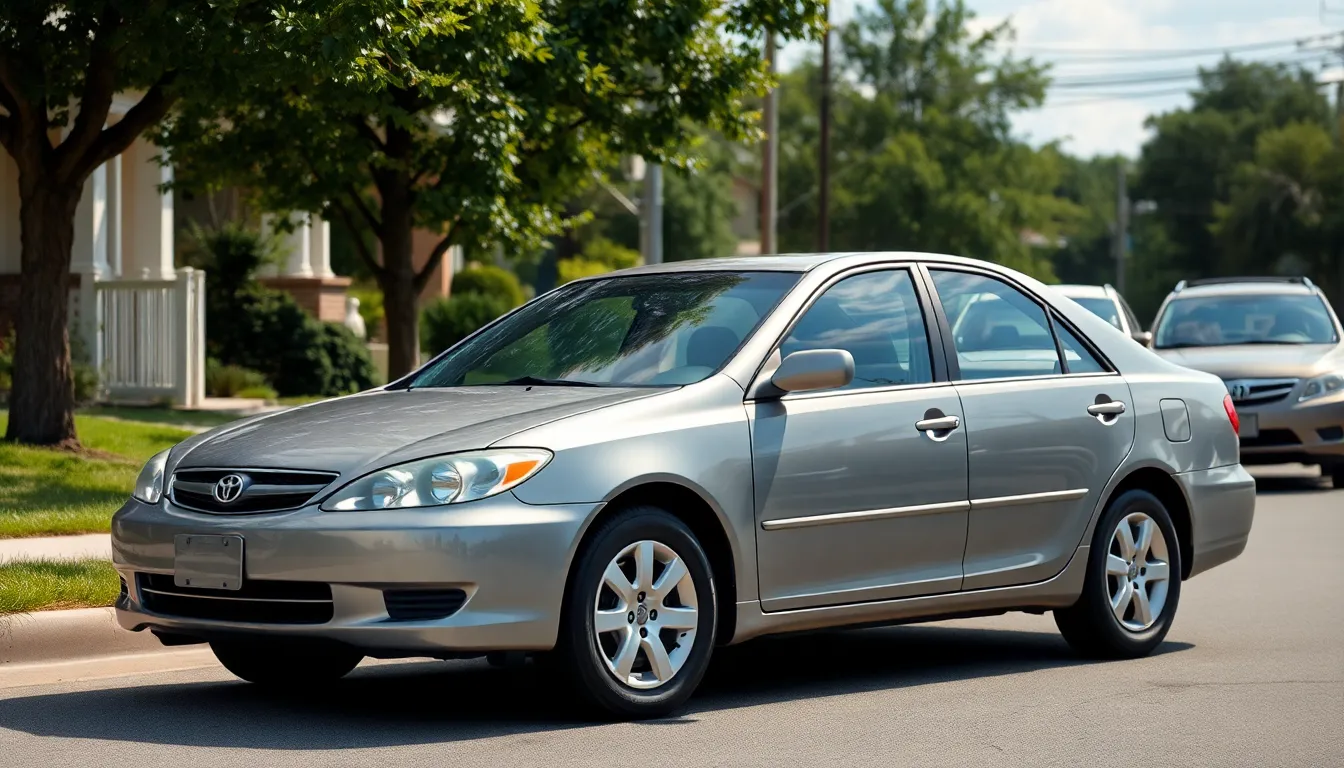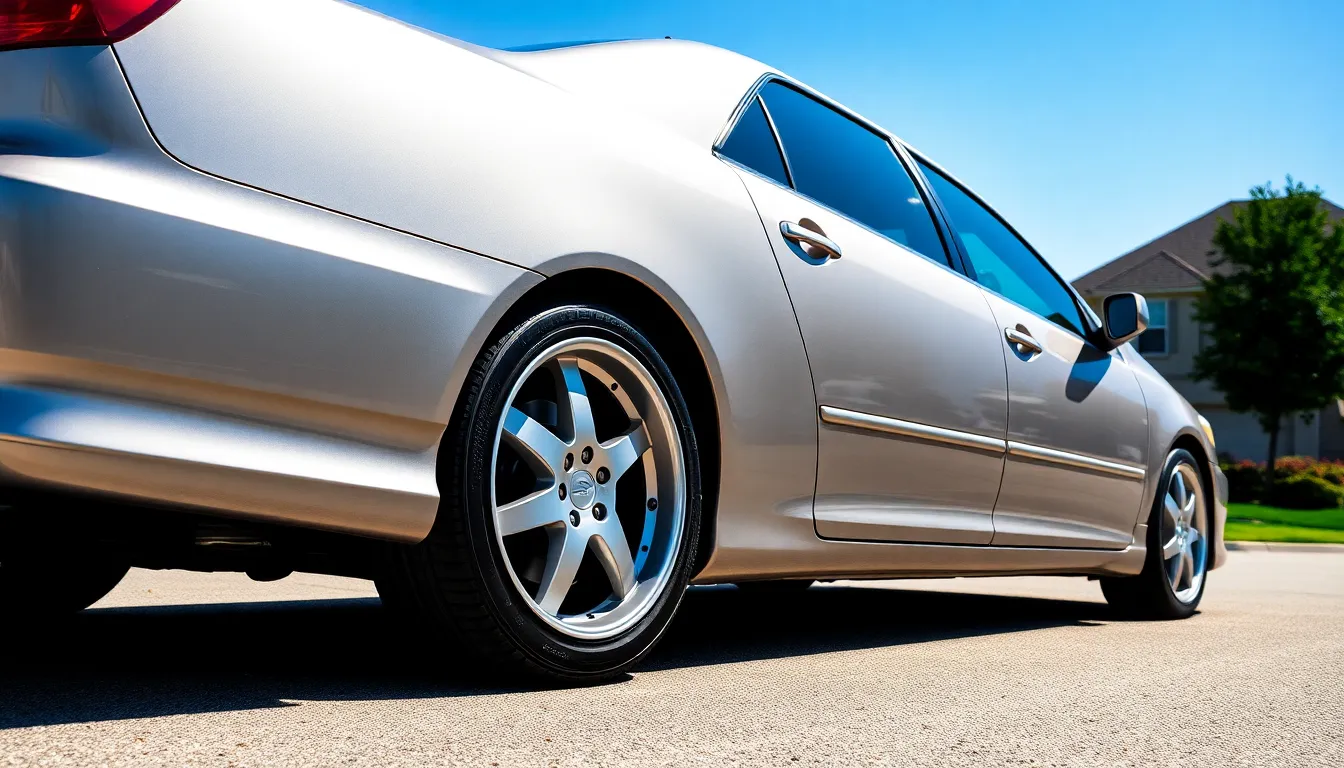Looking for the right Toyota Camry 2002 tire size? Finding the perfect tires for your reliable sedan doesn’t have to be a guessing game. With the right information at your fingertips, you’ll be back on the road with optimal performance in no time.
The 2002 Toyota Camry came equipped with exact tire sizes depending on the trim level. Whether you’re replacing worn tires or upgrading for better performance, knowing your vehicle’s exact specifications is crucial. Most 2002 Camry models typically use P205/65R15 or P215/60R16 tires, but your exact requirements may vary based on your particular trim package.
Understanding Toyota Camry 2002 Tire Specifications
The 2002 Toyota Camry offers exact tire specifications that vary across different trim levels. Each specification includes three key measurements: width, aspect ratio, and rim diameter. These measurements appear on your tire’s sidewall in a format like P205/65R15, where 205 represents the width in millimeters, 65 indicates the aspect ratio as a percentage, and 15 denotes the rim diameter in inches.
Factory Original Tire Sizes
Toyota equipped the 2002 Camry with two primary tire sizes depending on the trim level:
| Trim Level | Standard Tire Size | Optional Tire Size |
|---|---|---|
| LE and CE | P205/65R15 | None |
| SE and XLE | P215/60R16 | None |
The LE and CE trims feature the P205/65R15 size, providing a balanced combination of comfort and fuel efficiency. SE and XLE models come with the slightly larger P215/60R16 tires, offering enhanced handling and a more premium appearance.
Decoding the Tire Size Markings
Tire size markings contain valuable information about your Camry’s tires:
- P: Indicates a passenger vehicle tire
- 205 or 215: Tire width in millimeters
- 65 or 60: Aspect ratio (sidewall height as a percentage of width)
- R: Radial construction
- 15 or 16: Wheel diameter in inches
Additional markings on your tire sidewall include load index and speed rating symbols. For example, a typical 2002 Camry tire might show “91H” after the size, where 91 represents the load capacity and H indicates the speed rating (up to 130 mph).
Load and Speed Ratings
The load and speed ratings ensure your tires can safely handle your Camry’s weight and intended driving speeds:
| Trim Level | Typical Load Index | Speed Rating |
|---|---|---|
| LE and CE | 91-92 | S or T |
| SE and XLE | 94-95 | T or H |
These ratings are crucial safety factors that match your vehicle’s performance capabilities. Liam Kohn, our automotive specialist, recalls a customer who experienced important handling improvements after switching from worn, incorrectly sized tires to the proper OEM specifications on their 2002 Camry XLE.
Seasonal Tire Options
Your 2002 Camry’s performance varies with different seasonal tire types:
- All-Season: Original equipment on most 2002 Camrys, providing year-round performance
- Summer: Enhanced grip and handling in warm conditions
- Winter: Superior traction in snow and ice for Camry owners in colder regions
Many Camry owners in northern states switch between summer and winter tires seasonally. One customer from Minnesota reported that installing proper winter tires on his 2002 Camry LE transformed his winter driving experience from stressful to confident.
Original Equipment Tire Sizes for the 2002 Toyota Camry

The 2002 Toyota Camry features exact tire sizes that vary based on trim level. These factory-equipped tire dimensions ensure optimal performance, handling, and comfort for your sedan.
Base Model Tire Dimensions
Base model 2002 Toyota Camrys typically come equipped with 215/60R16 tires. These standard tires provide a balanced combination of comfort and performance for everyday driving conditions. Toyota designed these dimensions specifically for the entry-level Camry to deliver reliable traction and a smooth ride without compromising fuel efficiency.
LE and XLE Model Tire Options
LE and XLE trims of the 2002 Toyota Camry are fitted with 215/60R16 tires as original equipment. These mid-range and luxury models use the same tire size to maintain consistent handling characteristics across the lineup. The 215/60R16 dimensions offer ample sidewall for absorbing road imperfections while providing responsive steering for these popular trim levels.
SE Sport Model Tire Specifications
The SE Sport Model of the 2002 Toyota Camry also uses 215/60R16 tires for its stock configuration. Even though being the sportier variant in the lineup, Toyota opted to maintain the same tire dimensions as other trims while likely adjusting suspension components to enhance handling characteristics. The SE’s 215/60R16 tires complement its more aggressive styling and performance-oriented features without requiring different tire dimensions.
Recommended Replacement Tire Options

Finding suitable replacement tires for your 2002 Toyota Camry depends on your driving preferences, local climate conditions, and budget constraints. The following options cater to different price points while maintaining quality and performance standards.
Budget-Friendly Alternatives
Budget-conscious Camry owners have several reliable options that don’t compromise essential performance features. Green Max Optimum HP 205/65R15 94H BSW tires offer solid all-season performance with a 45,000-mile warranty, making them excellent value for daily commuting. Zeetex ZT3000 205/65R15XL 99H BSW provides enhanced load capacity with its XL rating while delivering comfortable touring qualities at an affordable price point. Blackhawk Street-H HH11 205/65R15 94H BSW tires balance good tread life with dependable wet and dry traction, perfect for drivers seeking longevity without very costly. These economical choices deliver respectable performance in most driving conditions without the premium price tag of high-end brands.
Premium Tire Choices
Premium tires for the 2002 Camry offer enhanced performance characteristics and longer tread life for those willing to invest more upfront. Lancaster LP-16 205/65R15 94H BSW tires feature an impressive UTQG rating of 560AA, providing superior grip and responsive handling for drivers who enjoy a more engaged driving experience. Armstrong Blu-Trac PC 205/65R15XL 99H BSW stands out with its remarkable 85,000-mile warranty, addressing the needs of high-mileage drivers who prioritize longevity and consistent performance throughout the tire’s lifespan. Achilles Touring Sport A/S 205/65R15 94H BSW tires deliver excellent all-season versatility with enhanced comfort and noise reduction, creating a more refined driving experience that complements the Camry’s reputation for smooth operation. These premium options typically feature advanced tread compounds and construction techniques that justify their higher price through improved performance metrics and extended service life.
How to Read Toyota Camry 2002 Tire Size Information

Understanding your Toyota Camry’s tire size markings is essential for proper maintenance and replacement. Tire size codes contain critical information about dimensions, construction, and performance capabilities that ensure optimal handling and safety.
Let’s break down a typical 2002 Camry tire size code (205/65R15 92H) to understand each component:
- First number (205): Represents the tire width in millimeters measured from sidewall to sidewall. In this example, the tire is 205mm wide.
- Second number (65): Indicates the aspect ratio – the height of the tire’s sidewall as a percentage of its width. Here, the sidewall height is 65% of the tire width.
- Construction type (R): Shows how the tire is constructed. “R” stands for radial construction, the most common type in modern vehicles.
- Rim diameter (15): Specifies the wheel diameter in inches that the tire fits. This 2002 Camry tire fits a 15-inch wheel.
- Load index (92): Identifies the maximum weight capacity of the tire. A load index of 92 corresponds to a exact weight rating.
- Speed rating (H): Denotes the maximum speed capability of the tire. An “H” rating indicates the tire can safely handle speeds up to 130 mph.
The 2002 Toyota Camry typically uses tire sizes ranging from 205/65R15 for base and LE trims to 215/60R16 for higher trims. Some sportier or customized models might use 215/55R17 or 225/50R17 tires for enhanced performance.
Factory-recommended tire pressure for the 2002 Camry generally hovers around 29 PSI (2.0 bar), though you should always verify the exact specification on the tire placard located inside your driver’s door jamb for optimal performance and safety.
Impact of Tire Size on Performance and Handling

Tire size significantly affects how your 2002 Toyota Camry performs on the road. Different tire dimensions create distinct driving experiences by altering grip, responsiveness, and overall handling characteristics.
Fuel Economy Considerations
Fuel efficiency varies noticeably between different tire sizes on the 2002 Camry. Smaller diameter and narrower tires (like 205/65R15) typically deliver better gas mileage due to reduced rolling resistance. These compact options create less friction with the road surface, requiring less energy to maintain momentum. Larger tires (such as 215/55R17 or 225/50R17) add weight and increase rolling resistance, potentially decreasing your Camry’s fuel economy by several percentage points during daily driving.
Ride Comfort and Road Noise
Tire sidewall height directly influences your Camry’s ride quality and cabin noise levels. Tires with taller sidewalls (205/65R15) provide extra cushioning against road imperfections, absorbing bumps and vibrations before they reach the vehicle’s suspension. This results in a smoother, more comfortable ride for daily commuting. Low-profile tires (225/50R17) transmit more road texture and noise into the passenger compartment, creating a firmer ride experience. The reduced rubber between your wheels and the road improves steering response but sacrifices some comfort, especially on rougher road surfaces. Your driving environment should influence which tire profile best suits your needs—urban drivers often prefer the comfort of taller sidewalls, while those seeking sportier handling might accept the trade-off of increased road noise.
Winter and All-Season Tire Options for the 2002 Camry

Winter driving demands specialized tires for your 2002 Toyota Camry, especially if you live in regions with heavy snowfall. Tire retailers offer 205/65R15 snow tires specifically designed for the 2002 Camry LE, providing enhanced traction on icy and snow-covered roads. These winter-exact options feature deeper treads and special rubber compounds that remain flexible in freezing temperatures.
All-season tires in the common 205/65R15 size present a practical year-round solution for Camry owners who experience mild seasonal changes. These versatile options come with various warranties and tread life ratings to match different driving needs. Many all-season models for the 2002 Camry feature UTQG ratings ranging from 340AA to 560AA, indicating their durability and performance characteristics ideal for daily commuting.
Choosing between winter and all-season tires depends on your local climate conditions and driving habits. For areas with occasional light snow, quality all-season tires might suffice, saving you the hassle of seasonal tire changes. Regions with harsh winters benefit significantly from dedicated winter tires, which dramatically improve stopping distances and overall control in challenging conditions.
Remember to check your Camry’s exact trim level before purchasing new tires, as sportier SE or XLE models might require larger sizes like 215/60R16 or 215/55R17 for proper fitment and performance. The right seasonal tire choice balances tread life, warranty coverage, and appropriate seasonal performance to keep your 2002 Camry safe and efficient throughout the year.
Conclusion
Choosing the right tires for your 2002 Toyota Camry doesn’t have to be complicated. Whether you own the LE/CE with P205/65R15 tires or the SE/XLE with P215/60R16 tires your selection will significantly impact handling performance and fuel economy.
Remember to check your exact trim requirements before purchasing and consider your driving conditions when deciding between all-season winter or summer options. Budget-friendly alternatives like Green Max Optimum HP offer solid performance while premium options provide enhanced longevity.
Maintain the factory-recommended tire pressure of approximately 29 PSI for optimal performance and safety. By understanding tire size markings and choosing appropriately you’ll ensure your 2002 Camry continues to deliver the reliable comfortable ride it’s known for.
Frequently Asked Questions
What tire size does a 2002 Toyota Camry use?
The 2002 Toyota Camry uses different tire sizes depending on the trim level. The LE and CE trims typically use P205/65R15 tires, while the SE and XLE models come with P215/60R16 tires. Always check your vehicle’s door jamb sticker or owner’s manual to confirm the exact specifications for your particular model.
How do I read tire size markings on my Camry?
Tire size markings like P215/60R16 92H indicate key specifications. The “215” represents width in millimeters, “60” is the aspect ratio (sidewall height as a percentage of width), “R” means radial construction, “16” is the rim diameter in inches, “92” is the load index, and “H” is the speed rating. Understanding these numbers helps ensure you purchase the correct replacement tires.
What is the recommended tire pressure for a 2002 Camry?
The factory-recommended tire pressure for a 2002 Toyota Camry is approximately 29 PSI (2.0 bar). However, always verify the exact specification for your specific model by checking the tire placard located inside the driver’s door jamb. Maintaining proper tire pressure ensures optimal performance, safety, and fuel economy.
Can I use different size tires on my 2002 Camry?
While it’s possible to use slightly different tire sizes, it’s best to stick with the manufacturer’s recommendations. Using non-standard sizes can affect speedometer accuracy, handling, and overall performance. If you want to change sizes, consult with a tire professional to ensure the new tires maintain the same overall diameter as the originals.
What are good budget tire options for a 2002 Camry?
Good budget-friendly tire options for a 2002 Camry include the Green Max Optimum HP and Zeetex ZT3000. These tires offer solid performance and reasonable longevity without breaking the bank. They provide adequate handling, traction, and comfort for everyday driving conditions while being more affordable than premium brands.
Do I need winter tires for my 2002 Camry?
If you live in an area with regular snow and ice, winter tires are highly recommended for your 2002 Camry. For the LE trim, 205/65R15 snow tires provide significantly better traction in winter conditions than all-season tires. In milder climates with occasional light snow, quality all-season tires may be sufficient.
How do different tire sizes affect fuel economy?
Tire size directly impacts fuel economy. Smaller tires typically offer better gas mileage due to reduced rolling resistance and weight. Larger tires (like the P215/60R16 on SE and XLE trims) may slightly decrease fuel efficiency but provide enhanced handling. Maintaining proper inflation is more important for fuel economy than minor size differences.
What’s the difference between the Camry LE and SE tire setups?
The Camry LE uses P205/65R15 tires with taller sidewalls that provide a smoother, more comfortable ride. The SE model comes with P215/60R16 tires that are wider with a lower profile sidewall, offering improved handling, cornering ability, and a sportier appearance. The SE’s larger 16-inch wheels also enhance the vehicle’s performance-oriented character.
How often should I replace tires on my 2002 Camry?
Tires on a 2002 Camry typically need replacement every 40,000 to 60,000 miles, depending on driving habits, road conditions, and tire quality. Replace tires when tread depth reaches 2/32 inch (use the penny test) or if you notice uneven wear, cracking, or bulging. Regular rotation every 5,000-7,000 miles extends tire life.
What premium tire options are available for the 2002 Camry?
Premium tire options for the 2002 Camry include the Lancaster LP-16 and Armstrong Blu-Trac PC. These higher-end tires offer enhanced performance characteristics including better wet traction, longer tread life, quieter operation, and improved handling. Though more expensive initially, premium tires often provide better value through longer service life.
